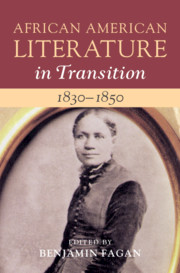Book contents
- African American Literature in Transition, 1830–1850
- African American Literature in Transition
- African American Literature in Transition, 1830–1850
- Copyright page
- Contents
- Contributors
- Preface
- Chronology, 1830–1850
- Introduction
- Part I Local Transitions
- Part II National Transitions
- Part III Transnational Transitions
- Index
Part II - National Transitions
Published online by Cambridge University Press: 07 May 2021
- African American Literature in Transition, 1830–1850
- African American Literature in Transition
- African American Literature in Transition, 1830–1850
- Copyright page
- Contents
- Contributors
- Preface
- Chronology, 1830–1850
- Introduction
- Part I Local Transitions
- Part II National Transitions
- Part III Transnational Transitions
- Index
Summary
The three chapters in this part focus on how African American writers engage with national legislation or policy. Emahunn Raheem Ali Campbell explores the interplay between the genre of the slave narrative and Supreme Court cases concerning copyright and fugitivity decided in the 1830s and 1840s. Looking in particular at the 1838 Narrative of James Williams, a work quickly challenged for its veracity, Campbell reveals important connections between literary works and legal decisions. Nihad M. Farooq moves from the courthouse to the post office as she interrogates the multiple and nuanced ways in which Harriet Jacobs engaged with developing communications technologies and policies ostensibly designed to connect different sections of the nation to one another. Reading Jacobs’s experiences in the 1830s in relation to an ongoing communications revolution in the United States, Farooq shows how Jacobs ingeniously manipulates formal and informal networks in order to secure freedom for herself and her family. With a focus on national legislation, Susanna Ashton reveals the profound impact that the 1850 Fugitive Slave Act had on the slave narrative by comparing narratives from the same author published before and after the passage of the act. Consulting pre- and post-1850 narratives by Henry Box Brown, William Grimes, and Josiah Henson, Ashton illuminates key ways in which the Fugitive Slave Act shaped one of the premier genres of African American literature.
- Type
- Chapter
- Information
- African American Literature in Transition, 1830–1850 , pp. 113 - 174Publisher: Cambridge University PressPrint publication year: 2021

